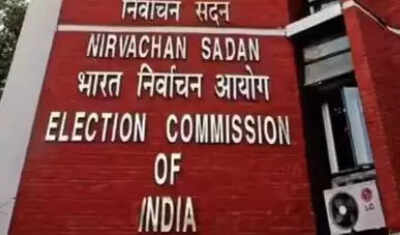ARTICLE AD BOX

Election Commission of India
NEW DELHI: The Election Commission will on Monday announce the first phase of the pan-India special intensive revision (SIR) of electoral rolls, covering 10-15 states/UTs, including poll-bound West Bengal, Tamil Nadu, Kerala, Assam and Puducherry. Sources in the poll body said the initial phase will leave out states like Maharashtra, where local body elections are to be held by Jan 31, 2026, as per Supreme Court directives, as well as the snow-bound states/UTs of J&K, Himachal, Uttarakhand, Sikkim and Ladakh. The last intensive revision of electoral rolls in India was undertaken two decades ago. Ahead of the EC presser, Tamil Nadu CM and DMK chief M K Stalin accused BJP of "plotting to remove names from voter list" ahead of state polls, as in
Bihar
. "It (SIR) deprived nearly 65 lakh voters in poll-bound Bihar of their voting rights," he alleged.Unlike Bihar, pan-India SIR to be announced at press meet DMK and other INDIA bloc parties have warned that BJP govt is "attempting to use EC as its puppet to replicate the same in Tamil Nadu", Stalin said in a letter to the party cadre. "BJP and its ally AIADMK believe that if the names of voters from the working class, minorities, scheduled castes, women and the poor are deleted through SIR, they can secure victory without facing the people. But this calculation will fail in Tamil Nadu," he said.
Unlike Bihar, where EC launched SIR with a written order, the pan-India exercise will be announced at a press conference, allowing any queries and doubts to be addressed on the spot. Sources indicated that the nationwide SIR shall be announced and conducted in stages, with three broad categories of states/UTs likely to witness the exercise later. These include states/UTs that will soon be in the grip of harsh winter and snow; ones where local body polls are due over the next three months and which are held with electoral rolls prepared as per provisions of the Representation of the People Act; and where at least 75%-80% of the electorate has already been mapped by matching current electors with entries in the roll from the last intensive revision, requiring only the remaining 20% or so to submit documents to prove their eligibility as per Article 326 of the Constitution. EC sources said the list of documents to be accepted as proof of eligibility will more or less remain the same as in Bihar and will only be indicative and not exhaustive. Aadhaar will only be accepted as proof of identity. Going by the three-month SIR schedule followed in Bihar, the enrolment stage for the first phase of SIR - requiring the elector to sign the enrolment form and, where required, submit proof of eligibility - may start on Nov 1 and the final roll published, after settling claims and objections to the draft roll, by Jan end or beginning of Feb. The groundwork for the upcoming countrywide SIR - the intent for which was announced by EC in its June 24 notification for SIR in Bihar - has been under way for the past two months, with two separate conferences of chief electoral officers held by EC in Sept and Oct. The last CEOs conference on Oct 22-23 saw EC assessing the preparedness of all state/UT CEO offices, particularly progress of the mapping of their current electors with the roll from the last intensive revision. With Bihar having shown the way, sources said, CEOs are better prepared for the SIR and the EC's confident of pulling off a cleaner, error-free electoral roll after removing duplicate entries, illegal immigrants, and dead or shifted voters. All state/UT rolls are digitised and map-ped with the roll from the last SIR, with 50%-70% electors already linked to it; booth level officers have been trained and parties urged to appoint enough booth level agents.

 2 hours ago
6
2 hours ago
6









 English (US) ·
English (US) ·